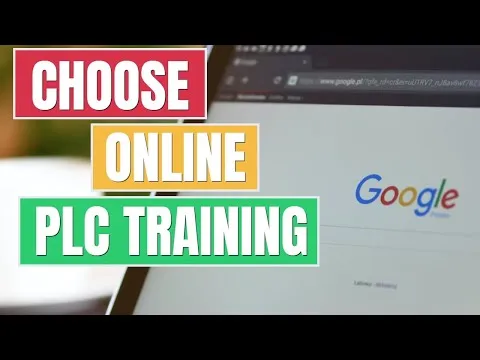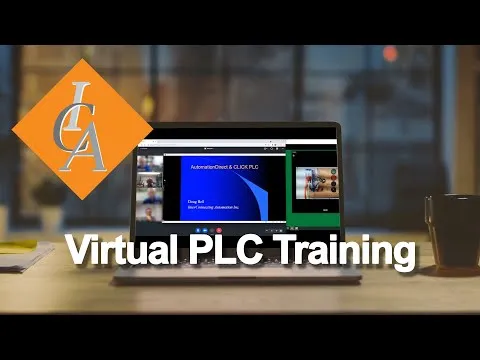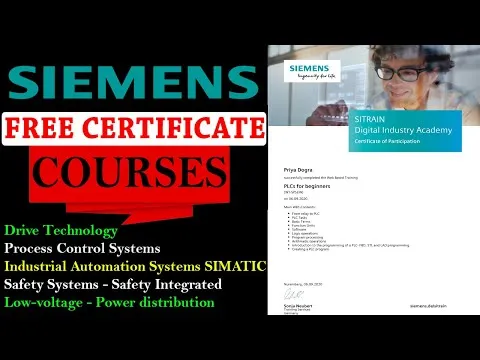
Choose The Right PLC Programming Training Course - For Beginners Learning PLC Programming at Home 
"Choose The Right PLC Programming Training Course - For Beginners Learning PLC Programming at Home"
Looking to kickstart your career in automation and robotics? Look no further! This video offers valuable insights on choosing the perfect online PLC programming training course. Worried about the cost and time commitment? Don't fret! Our expert will address all your concerns and provide helpful suggestions. With a shortage of qualified applicants in this field, now is the perfect time to embark on a journey that offers world-wide travel, cutting-edge technology, leadership opportunities, and lucrative incomes. Discover the shortcuts to becoming a successful PLC programmer and unlock your potential today! Follow us on Facebook for more information. ▼
ADVERTISEMENT
Course Feature
![]() Cost:
Cost:
Free
![]() Provider:
Provider:
Youtube
![]() Certificate:
Certificate:
No Information
![]() Language:
Language:
English
![]() Start Date:
Start Date:
2020-05-05 00:00:00
Course Overview
❗The content presented here is sourced directly from Youtube platform. For comprehensive course details, including enrollment information, simply click on the 'Go to class' link on our website.
Updated in [September 26th, 2023]
We considered the value of this course from many aspects, and finally summarized it for you from two aspects: skills and knowledge, and the people who benefit from it:
(Please note that our content is optimized through artificial intelligence tools and carefully reviewed by our editorial staff.)
What skills and knowledge will you acquire during this course?During this course, learners will acquire the following skills and knowledge:
1. Understanding of PLC (Programmable Logic Controller) programming fundamentals: The course will cover the basics of PLC programming, including the structure and components of a PLC system, ladder logic programming, and input/output (I/O) modules.
2. Hands-on experience with PLC programming software: Students will gain practical experience by using PLC programming software to create and test programs. They will learn how to write and troubleshoot ladder logic programs, configure I/O modules, and simulate PLC operation.
3. Knowledge of industrial automation concepts: The course will provide an overview of industrial automation systems and their applications. Learners will understand the role of PLCs in automation and how they integrate with other components such as sensors, actuators, and human-machine interfaces (HMIs).
4. Troubleshooting and debugging skills: Students will learn techniques for identifying and resolving common issues in PLC programs. They will acquire problem-solving skills to diagnose faults, interpret error messages, and implement corrective actions.
5. Understanding of safety considerations in PLC programming: The course will emphasize the importance of safety in industrial automation. Learners will learn about safety standards, risk assessment, and best practices for designing and implementing safe PLC programs.
6. Knowledge of advanced PLC programming techniques: The course may cover advanced topics such as data handling, timers and counters, analog input/output, and communication protocols. Students will gain a deeper understanding of PLC programming capabilities and how to apply them in real-world scenarios.
By completing this course, learners will be equipped with the necessary skills and knowledge to start a career in PLC programming and automation. They will have a solid foundation in PLC programming fundamentals, hands-on experience with PLC software, and an understanding of industrial automation concepts.
Who will benefit from this course?
The course will benefit individuals who are interested in pursuing a career in automation and robotics. Specifically, it will be beneficial for:
1. Beginners: This course is designed for individuals who are new to PLC programming and want to learn the basics from scratch. It provides a comprehensive introduction to PLC programming, making it suitable for beginners.
2. Automation Professionals: Professionals already working in the automation industry can benefit from this course to enhance their skills and knowledge in PLC programming. It can help them stay updated with the latest advancements in the field and improve their career prospects.
3. Engineers: Engineers from various disciplines, such as electrical, mechanical, or industrial engineering, can benefit from this course to gain a solid understanding of PLC programming. It can help them integrate PLC systems into their projects and improve their overall engineering skills.
4. Technicians: Technicians involved in the maintenance and troubleshooting of PLC systems can benefit from this course to deepen their understanding of PLC programming. It can help them diagnose and fix issues more efficiently, leading to improved system performance.
5. Students: Students studying engineering or related fields can take this course to supplement their academic knowledge and gain practical skills in PLC programming. It can give them a competitive edge in the job market and increase their chances of securing internships or entry-level positions.
Course Provider

Provider Youtube's Stats at AZClass
Discussion and Reviews
0.0 (Based on 0 reviews)
Explore Similar Online Courses

A Look Inside The Best Online Course for NEW Dental Receptionists

PLC Certification Courses Online PLC Free Certificate PLC Programming Online Training

Python for Informatics: Exploring Information

Social Network Analysis

Introduction to Systematic Review and Meta-Analysis

The Analytics Edge

DCO042 - Python For Informatics

Causal Diagrams: Draw Your Assumptions Before Your Conclusions

Whole genome sequencing of bacterial genomes - tools and applications

NEW : Live online PLC training classes from InterConnecting Automation at AutomationDirect

Siemens FREE Online Courses with Certificate - PLC and Automation Course Certification


Start your review of Choose The Right PLC Programming Training Course - For Beginners Learning PLC Programming at Home